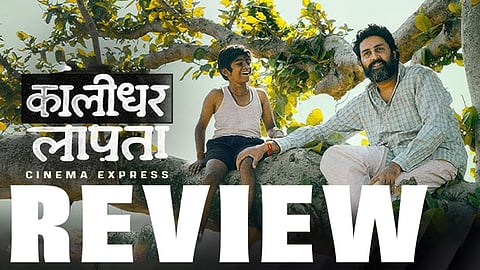Kaalidhar Laapata Movie Review: Abhishek Bachchan thrives on rough edges in an inconsistent film
Kaalidhar Laapata(2 / 5)
Kaalidhar Laapata Movie Review:
What is it with Abhishek Bachchan? The actor has done almost everything—played a tough, no-nonsense cop in the Dhoom films, only to be sidelined by the charismatic villains; led two box-office hits in 2005, Bunty Aur Babli and Bluffmaster!, while also starring in the enigmatic Sarkar (2005). He has been the muse of two distinct Mani Ratnam films—Guru (2007) and Raavan (2010)—bringing completely different energies to each. Yet, he seems to not have gotten his due, carrying the heavy shadow of his father, who has practically defined the grammar of popular Hindi films with his staggering persona that has stayed in public consciousness for decades. How do you get away from that legacy and carve your own?
When he tried to do that in recent years, with The Big Bull (2021), the film lost limelight to Hansal Mehta’s Scam 1992: The Harshad Mehta Story (2020) which was released before. Last year, when he collaborated with Shoojit Sircar for I Want to Talk, delivering a stellar performance, it turned out to be a tale too obscure, too niche. He followed that up with Remo D’Souza’s drab dance-drama Be Happy (2025) and the multi-starrer cringefest, Housefull 5 (2025). Abhishek returns to play a father figure in Madhumita’s Kaalidhar Laapata, the Hindi remake of her Tamil film, KD (2019). But it’s all too flawed, all too lost in trying to find its footing.
The film has a major problem in its logline. The original centered on the life of an 80-year-old man who overhears his family planning his death by performing the Thalaikoothal ritual which is prevalent in some parts of Tamil Nadu. After knowing this, he leaves home. In comparison, the Hindi adaptation starts with a middle-aged Kaalidhar (Abhishek) who suffers from memory loss. His disease becomes a burden on his family consisting of two brothers, who are eying his wealth. So, they decide to take him to the Maha Kumbh Mela and leave him in the bustling crowd. It seems like the perfect North-Indian setting. Add to that a rousing Mohammed Zeeshan Ayub, playing Subodh, a government official tasked with finding Kaalidhar. Yet, there are far too many rough edges.
Director: Madhumita
Cast: Abhishek Bachchan, Mohammed Zeeshan Ayyub and Daivik Bhagela
Streamer: ZEE5
After escaping from Benaras, a disgruntled Kaalidhar arrives in a village and befriends Ballu (Daivik Bhagela), a homeless kid living near a temple. The heart of the story is the jovial relationship between Kaalidhar and Ballu. He teaches Kaalidhar to be happy and not worry about his family members who abandoned him. “Stop waiting and do what you always wanted to do in life,” Ballu tells him. It feels like an adult talking through the mouth of a 10-year-old. Their relationship doesn’t seem organic.
The dialogues seem forced, and Ballu is extraordinarily zen-like for a child living on the margins. He is almost romanticised, giving sermons to Kaalidhar, making him fulfil his bucket list even though there is no clock ticking. The sense of urgency of old age, which adds an effective layer in the Tamil film, is completely missing here. Hence, the bond that the two share isn’t as warming as the film makes it out to be. When Ballu is asked what Kaalidhar is to him and he says, “Everything”, it doesn’t register as such. It feels that we are not part of this journey with them.
Even the illness of Kaalidhar isn’t consistent. It feels sketchy at best, written only to aggravate his condition and make up for the fact that he isn’t eighty. His family members are painted all black, shown with ill intentions of having an eye only on Kaalidhar’s property. There is an urgent lack of nuance in the writing. The screenplay gets distracted in the second half as Ballu assists Kaalidhar in finding his long-lost lover and Nimrat Kaur makes a rather uneventful special appearance.
Abhishek is committed to the character but approaches it with a touch of pity. He dives little into Kaalidhar’s vulnerabilities but still manages to put on a convincing show for the most part. As the street-smart, chirpy kid, Daivik isn’t as likeable as his performance is toned a tad too high. In comparison, Zeeshan stays consistent in emoting the sincerity of his character even when the screenplay takes some sudden jumps.
The film has stunning camera work by Gairik Sarkar and an evocative soundtrack by Amit Trivedi. Yet, this is not the script that lets them soar. It drags and meanders, gradually deflecting from the original as it struggles to find its own shape. The problem lies in adaptation, taking a culturally rooted story and reimagining it without the same authenticity. So, Kaalidhar Laapata becomes its own. It is not just lost but also forgotten in translation. For Abhishek, it marks yet another film that signals his intent to pursue lively, meaningful work. Yet, he continues to remain adrift; earnest in effort, misplaced in material.

